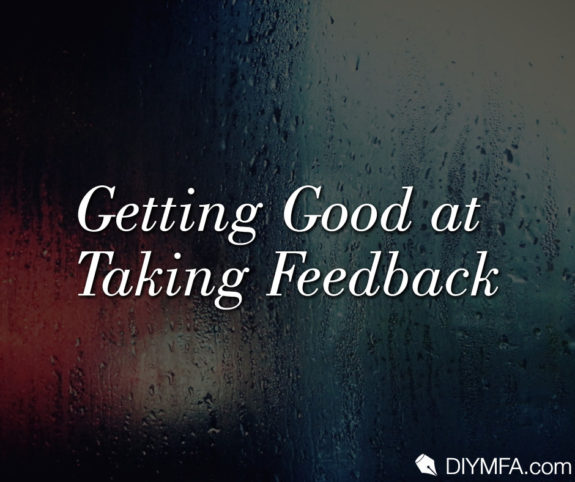Do you think you are good at taking feedback?
You: “Hey, do these sentences look okay? Could you take a look? They’re from a work in progress:
The Blue Arrow Gallery is a newish silver box with large windows in the front. It sits a half dozen blocks from downtown on the edge of the busy, buzzy restaurant scene of hip River North.
What do you think? Thank you so much.”
++
Sharing a few sentences (with anyone) is low stakes. Right? You’re happy to tweak anything that doesn’t seem to work.
Here, the possible changes are few. Should ‘large’ be more specific? Should ‘half-dozen’ be ‘six’? Should you add ‘neighborhood’ after ‘River North’?
But when it comes to taking feedback on the first draft of your precious novel and its diamond prose, everything changes. You’ve spent a year or two writing. You have developed a full cast of engaging characters. You’ve crafted original scenes. Your action sequences rock. The love scenes aren’t hokey. The draft feels personal, edgy, and interesting all at once.
But, are you right? Or delusional?
Before you head out to seek an agent or buttonhole an editor at a pitch fest, you want feedback from a few beta readers. You need feedback, you must have feedback. Now, the stakes are much higher. Negative comments mean rewriting. And work. How will you know what constitutes a legitimate analysis? How will you make sense of a small mountain of suggestions? Like every other aspect of writing fiction, taking feedback is something you can get better at doing. It’s another muscle to discover, develop—and then flex.
How?
Well, first, know that you’re not sharing your treasured work with readers because you were told this was part of the process and you wanted to be able to tell your Dream Agent that your early readers were all moved to tears (or whatever the case may be). This is not a check-the-box step.
No.
You are sharing your novel with beta readers because you want to know if the story you’ve created delivers the emotional punches you wanted to land. You want to know ways to make it better—sleeker, cleaner, tighter, whatever the case might be.
You want to know if the clock you’ve built tells the right time.
But you bristle at the idea that you might have to actually listen to what these readers have to say. You can already feel yourself getting defensive. What if your beta readers don’t get what you’re trying to do?
By the way, beta readers? They really should be called alpha readers. You are the writer. Technically, you might be the first reader. But you’re disqualified. Unless you stick the novel in a drawer for a good five years and then come back to it, you’re no good at this important step. Your eyes are too familiar with the words and your writer head knows far too much about what the challenges ahead for your characters.
++
The following is the equivalent of a gym workout to develop that crucial taking feedback muscle:
1. Read Early Drafts From Other Writers
Once you’ve joined a writing group or assembled your own network of up-and-coming writers, volunteer to read the green, fresh-off-the-presses drafts of novels by your colleagues. Read with care. Read with heart. Read with a critical eye. Read with the same standards you use to write—the same standards that prompt you to dump stale chapters and strike-through clunky dialogue. Read with an eye for character motivation and an ear for prose that snaps and dazzles. Read to get inside the characters on the page and challenge yourself to understand what makes them tick.
And, finally, read with an awareness of why this book is not yet in hardback and zipping its way up the New York Times bestseller list.
Then, form your thoughts on paper. Write three or four pages. Don’t overwhelm. Start with mentioning the things you liked—definitely—then list the issues you struggled with or questioned, and close with some upbeat thoughts about the prospects for the next draft. Offer to follow-up with a telephone conversation or Zoom. Remember—the writer of this novel may have spent a year or two putting the story together. As the first taste-tester in the kitchen, you need to deliver more than “needs more salt.” A colleague has created a work of art. You are going to help make it better. It’s a privilege.
By the third or fourth such beta-reading effort on your part, you will notice you have a different take on your own fresh prose. Cue lightbulb moment.
2. Join Critique Groups
Same as above, but more organized. And regular. Critique group people swear by critique groups. Every critique group operates with its own rules, systems, and ethos. Some are a tight-knit group of five or six writers who have met weekly for years and years, bringing fresh pages every week to the table.
As a member of a critique group, you get to watch a half-dozen novels blossom all at once. You also have the opportunity to hear how writers think about their works. And, when it’s your turn to discuss your writing, you get the opportunity to articulate your ideas about why your characters do what they do, say what they say, and choose the battles they fight. You also get the opportunity to hear and respond to feedback.
Note: the goal here is not to get better at pretending the feedback doesn’t sting. The goal is to get better at taking feedback.
The goal is to get good at being able to detach yourself from what you’ve created and discuss ideas to improve it—no different than if the book with your name on it was written by another writer.
One big advantage of a critique group is you are getting input as the story goes—and this can be advantageous. Some writers, however, need to finish a whole book before showing the first scene of Chapter 1 to anyone. But every writer should try a critique group at least once. They create tremendous accountability for producing a story—and often a great sense of community. It’s also terrific to have other writers to cheer for as their works progress, as they land an agent, as they launch, and so on.
3. Review Books
You are reading, right? Reading lots of books in your genre? And lots of others, too?
Writing reviews sharpens your analysis of what works. This should be a habit. Assembling your thoughts in written form, and publishing on a review site or on your personal blog, sharpens your game (much like those college essays forced you to defend a thesis).
This act of writing reviews again sharpens your thought process as you are drawn into a novel or as you watch a novel fall apart. Because you will be recommending or not recommending the book, your radar clicks up to a new level of sensitivity and awareness. You develop tolerance levels and apply them to a whole smattering of fictional elements—and in turn hone your own style without even trying.
Chances are, for the most part, you’ll review books you like. The added side bonus is connecting with writers. You tag them on social media posts with links to your review and you might soon find your virtual network growing in a positive way, even with established writers.
And soon writers in your network, who appreciate reading your takes on both celebrated and overlooked authors, might hope that you will review their books.
4. Judge
If asked to judge a writing contest, do it. All the same benefits from 1, 2, and 3 above apply.
The bottom line?
The feedback loop is an integral part of the writing process. Analyzing the works of others improves your ability to self-edit. To self-criticize. To get better at taking feedback themselves.
So, toast your alpha readers. Appreciate them. Thank them.
Feedback? Bring it on.

Mark Stevens writes the Allison Coil Mystery Series—Antler Dust, Buried by the Roan, Trapline, Lake of Fire and The Melancholy Howl. Trapline won the Colorado Book Award and The Colorado Authors League Award in 2016. Buried by the Roan and Lake of Fire were finalists for the same award. Kirkus Reviews called Lake of Fire “irresistible” and The Melancholy Howl “smart and indelible.” Mark was the 2016 Rocky Mountain Fiction Writers’ Writer of the Year. Mark’s agent (Josh Getzler, HG Literary) is currently representing two novels—one a standalone mystery and one literary novel set in the world of professional baseball. Mark lives in Mancos, Colorado







